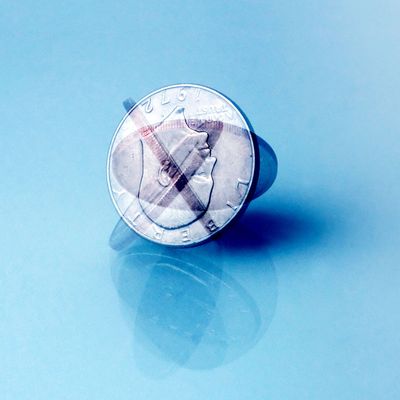
Let’s get right to the point, because it’s a good one. In a recent study, Steven D. Levitt (of Freakonomics fame) found that people who decided to change their lives in some huge way — quitting a job, getting engaged, getting divorced — were happier than those who took no action, and stuck with the status quo.
But here is the best part, which, as is often the case, is also the weirdest part: In the end, the decision to shake up their lives was not the result of careful thought and deliberation. It was the result of a simple coin toss.
In a recent working paper, Levitt describes the intriguing experiment he conducted for about a year at the now-defunct FreakonomicsExperiments.com. (A “working paper” means that the author is sharing a preliminary version of his or her findings in order to spark discussion; the research has not yet been peer-reviewed.) In a series of advertisements on the Marketplace podcast* and elsewhere, he sought out people who were having trouble with some potentially life-altering decision, inviting them to come on over to his website and donate their indecisiveness to science. On the site, people could choose from one of 30 questions, ten of which Levitt deemed “important.” Those were things like: Should I quit my job? Should I break up with my significant other? Should I go back to school? Should I get engaged? (By the way, according to this study, the two hardest decisions people make are those to do with work and love that have passed their expiration dates: The most popular question listed was whether to quit a job, which was the subject of 2,186 tosses. The next most popular was whether to break up with a significant other, at 1,686 tosses.)
They chose the question currently plaguing them, flipped the (virtual) coin, and then were shown the results of that randomized toss. Heads meant make the change; tails meant status quo. Afterward, Levitt kept up with the coin-tossers, who were supposed to respond to surveys two months and six months later that would ask whether they’d indeed gone with the coin flip’s instruction, and how happy they were with the decision. In total, the coin was flipped more than 22,000 times, and though not everyone responded to those surveys, a sizable amount did: At two months, Levitt got about 13,000 surveys back, and at six months, about 8,000.
Some of the participants did not let a coin flip guide their life, but a surprising percentage did. For the less important decisions, such as whether or not to dye their hair or to join a gym, about 67 percent did what the coin told them. For the important ones, more than half (about 55 percent) ended up acting in accordance with the coin toss. In both scenarios, those who had made a change were “substantially happier than those who do not make a change,” Levitt writes. “This is true for virtually every question asked both two months and six months later,” and this was especially true when the changes made were big ones.
The lesson here isn’t to start making all your major life decisions with a literal coin toss. (Though that would be impressively daring.) Instead, it’s to veer toward action more often than inaction. Sometimes, the big decisions of your life are hardly decisions at all; instead, they’re the result of some choice you never actually made. You spend countless hours, for instance, waffling over whether to finally leave a job you hate — the thought of quitting is exhilarating, and yet the uncertainty is terrifying. And so, in the end, you do nothing. Status quo it is.
Much of the psychology literature indeed suggests that people are drawn to the status quo. If you give people a choice between a new, improved health-insurance plan over one they’re already familiar with, for example, research has suggested that most will go with the one they know. New Coke’s famous sales flop is another example of the status-quo bias: In blind taste tests, people preferred the sweeter taste of the newer version of the soda over the classic kind, but when they had to choose, they tended to go for the taste they knew. (Better the devil you know, etc.) But there’s that quote certain kinds of people like to post on Instagram and Pinterest, that one of questionable origin that goes, “Twenty years from now you will be more disappointed by the things you didn’t do than by the ones you did do.” This turns out to be true, according to researchers who study regret: People really are more likely to regret inaction over action.
As Levitt phrases it in his abstract, “People may be excessively cautious when facing life-changing choices.” If you are torn between adventure and stasis — between doing something and doing nothing — take the adventure. Odds are you’ll be happier for it.
*An earlier version of this post stated that Marketplace was an NPR podcast. It is an American Public Media podcast.




